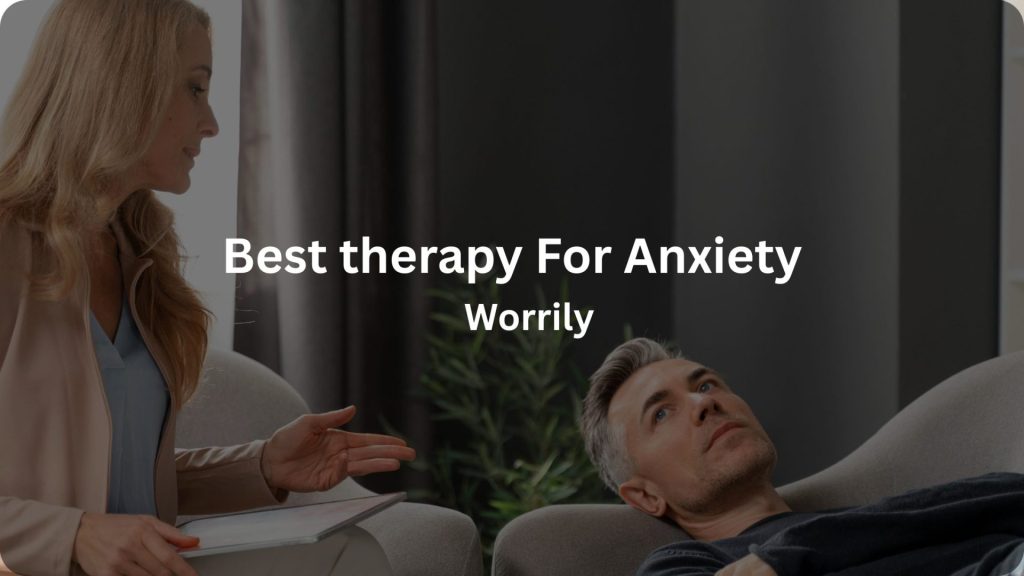Anxiety is a prevalent issue that impacts millions of people around the world. From mild feelings of nervousness to debilitating conditions, anxiety can interfere with daily life. It can be a constant battle, but there are effective ways to manage it through therapy and self-care.
If you’re looking for the best therapy for anxiety, understanding your options and finding what works best for you is key.
In this blog, we’ll dive deep into various therapies, treatments, and helpful practices that can assist in reducing anxiety symptoms, providing value for anyone struggling with this common mental health issue.
What is the Best Way to Overcome Anxiety?
When it comes to overcoming anxiety, the “best way” will vary from person to person. Overcoming anxiety requires a combination of strategies that work for the individual. In my experience, the most effective way to manage anxiety involves a balance of therapy, lifestyle changes, and in some cases, medication.
The cornerstone of overcoming anxiety is often therapy, particularly Cognitive Behavioral Therapy (CBT). This therapy focuses on helping individuals identify and challenge negative thought patterns that contribute to anxiety. CBT teaches patients how to reframe these patterns, ultimately leading to a reduction in anxious feelings over time.
However, therapy is just one piece of the puzzle. A holistic approach that includes physical activity, such as regular exercise or yoga, can help manage symptoms. Incorporating relaxation techniques like deep breathing and mindfulness can also be beneficial in reducing anxiety.
From my personal perspective, developing a strong support system and practicing self-care also play crucial roles in overcoming anxiety. It’s important to recognize that while anxiety can be overwhelming at times, there are many ways to regain control and create a sense of peace.

What Type of Therapist is Best for Anxiety?
Choosing the right therapist can be crucial in your journey toward managing anxiety. Clinical psychologists, licensed professional counselors, or psychotherapists who specialize in treating anxiety disorders are typically the best choices.
Within therapy, Cognitive Behavioral Therapy (CBT) or Exposure Therapy are often highly effective for anxiety.
Sports psychology helps individuals develop mental strategies to cope with stress, focus better, and reduce anxiety.
Techniques such as mental imagery and relaxation exercises are often used in this field, and they can be incredibly effective for those dealing with performance anxiety or general stress.
If your anxiety is severe or complicated by other mental health issues, it may also be beneficial to seek out a therapist who specializes in sports psychology.
While sports psychology is typically associated with performance in athletes, it also offers valuable strategies for managing stress and anxiety.
Techniques such as mental imagery, relaxation exercises, and focus training can help reduce anxiety symptoms.
What is the Most Effective Treatment for Anxiety?
There are several treatment options available for managing anxiety, but the most effective treatments often combine therapy and medication.
Cognitive Behavioral Therapy (CBT) is a widely recognized treatment for anxiety.
This therapy helps individuals confront their anxious thoughts and develop healthier coping mechanisms.
Over the years, I have seen how impactful CBT can be in reducing anxiety, as it empowers individuals with practical skills they can use in everyday situations.
In some cases, medication may be necessary, especially for those experiencing chronic or severe anxiety.
Selective serotonin reuptake inhibitors (SSRIs) are a common class of medications prescribed for anxiety, as they help balance the chemicals in the brain associated with mood regulation.
When medication is prescribed, it’s often most effective when combined with therapy.
In addition to these traditional treatments, many individuals find relief from anxiety through mindfulness practices, such as meditation or yoga.
These techniques have been shown to reduce stress levels, improve concentration, and create a sense of calm.
I have worked with many individuals who have incorporated mindfulness into their therapy routines, seeing notable improvements in their mental well-being.
What Are the Symptoms of Bad Anxiety?
Anxiety symptoms can vary widely depending on the individual, but severe or persistent anxiety can manifest both physically and emotionally. Common symptoms
of intense or “bad” anxiety include:
- A racing heart or palpitations
- Excessive worry or fear
- Difficulty concentrating or focusing
- Muscle tension or headaches
- Irritability or sudden mood changes
- Feeling overwhelmed or “on edge”
- Sleep disturbances, such as insomnia
When anxiety becomes overwhelming, it can affect not just emotional well-being but physical health as well. In my experience, one of the first steps to managing severe anxiety is identifying the symptoms and seeking help early.
The sooner anxiety is addressed, the easier it is to reduce its impact on your life.
How Long Does Therapy Take for Anxiety?
Therapy for anxiety is not a quick fix; it requires time and commitment. The duration of therapy varies depending on the severity of your anxiety, your commitment to the process, and the type of therapy used.
On average, many people begin to notice significant improvement after 8 to 12 sessions. For some, therapy may last longer, particularly if anxiety is chronic or accompanied by other mental health conditions.
From my personal experience, individuals who are consistent with therapy often make steady progress. However, it’s important to remember that therapy for anxiety doesn’t have an end date it’s an ongoing journey.
Some people may return for checkup even after they have achieved noticeable improvements, just to maintain their mental health.
Additionally, incorporating practices like journaling, exercise, and mindfulness into daily life can help reinforce the lessons learned in therapy and support long-term success.
Can People with Anxiety Live Long?
Yes, people with anxiety can absolutely live long, fulfilling lives. The important thing is to manage anxiety effectively and seek help when needed.
While anxiety itself doesn’t necessarily shorten life expectancy, untreated anxiety can lead to additional health problems, such as high blood pressure, sleep issues, and digestive problems.
When anxiety is managed through therapy, medication (if necessary), and lifestyle changes, it’s entirely possible to live a long, happy, and successful life.
Many individuals with anxiety accomplish amazing things in their careers and personal lives, especially when they embrace therapy and take an active role in managing their mental health.

Conclusion:
The best therapy for anxiety involves a personalized approach that may include therapy, medication, and lifestyle changes.
Cognitive Behavioral Therapy (CBT) remains one of the most effective treatments for anxiety, helping individuals manage and reduce negative thoughts and feelings.
It’s important to seek a therapist who specializes in anxiety disorders and choose treatment options that work best for your specific needs.
Remember that overcoming anxiety is a gradual process, and consistency is key. Whether through therapy, self-care practices, or professional support, people with anxiety can lead long, healthy, and happy lives with the right strategies in place.
By choosing the right therapy and staying committed to the process, you can take control of anxiety and live a fulfilling life.
From my experience, the best approach to overcoming anxiety is one that is personalized.
There is no single method that works for everyone. It may take time to figure out which combination of therapy, medication, and lifestyle changes works best for you. But with the right support and resources, you can effectively manage anxiety and live a fulfilling life.
It’s important to remember that you’re not alone in this journey, and there are many tools and therapies available that can help you regain control and improve your overall well-being.
